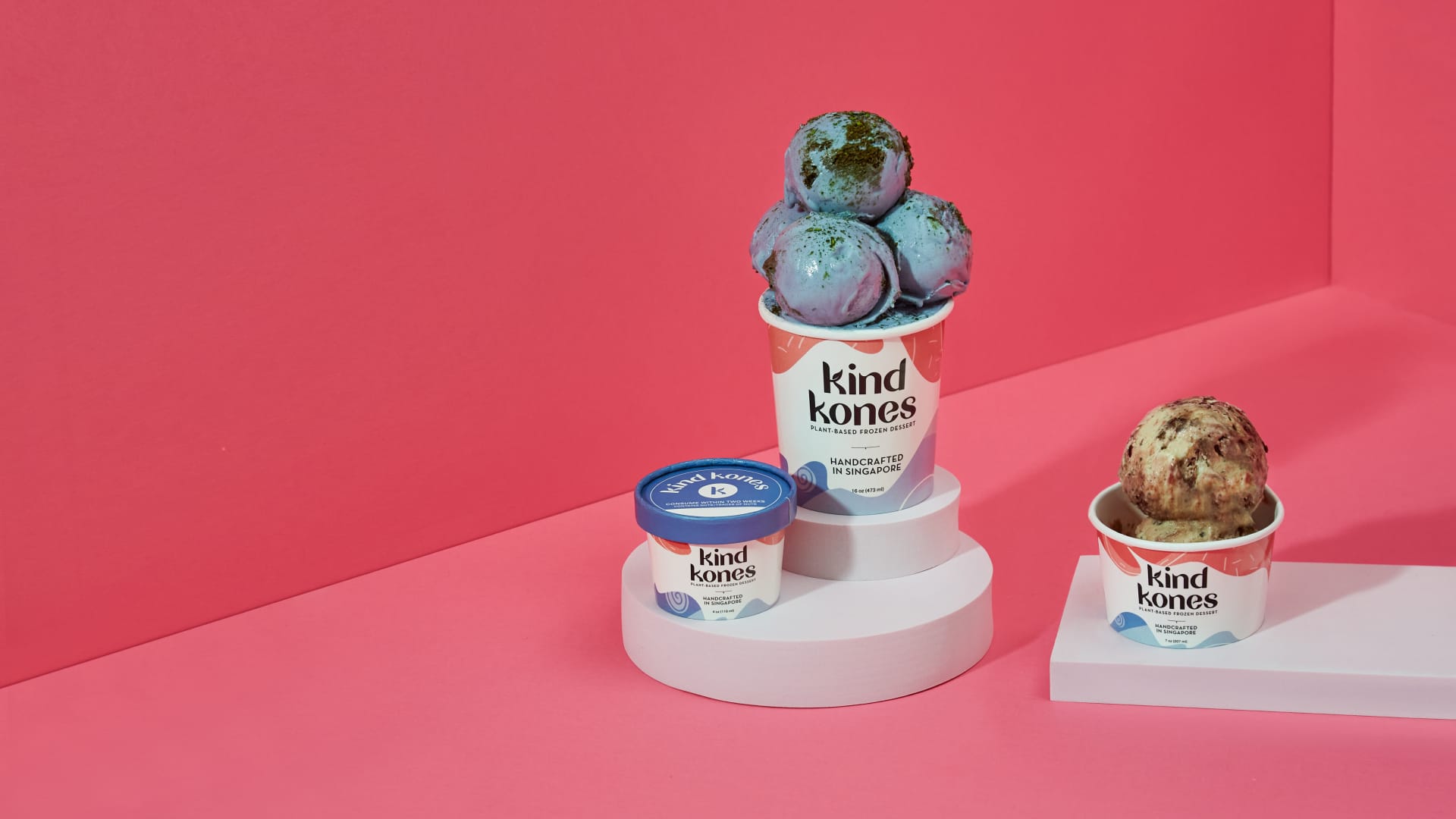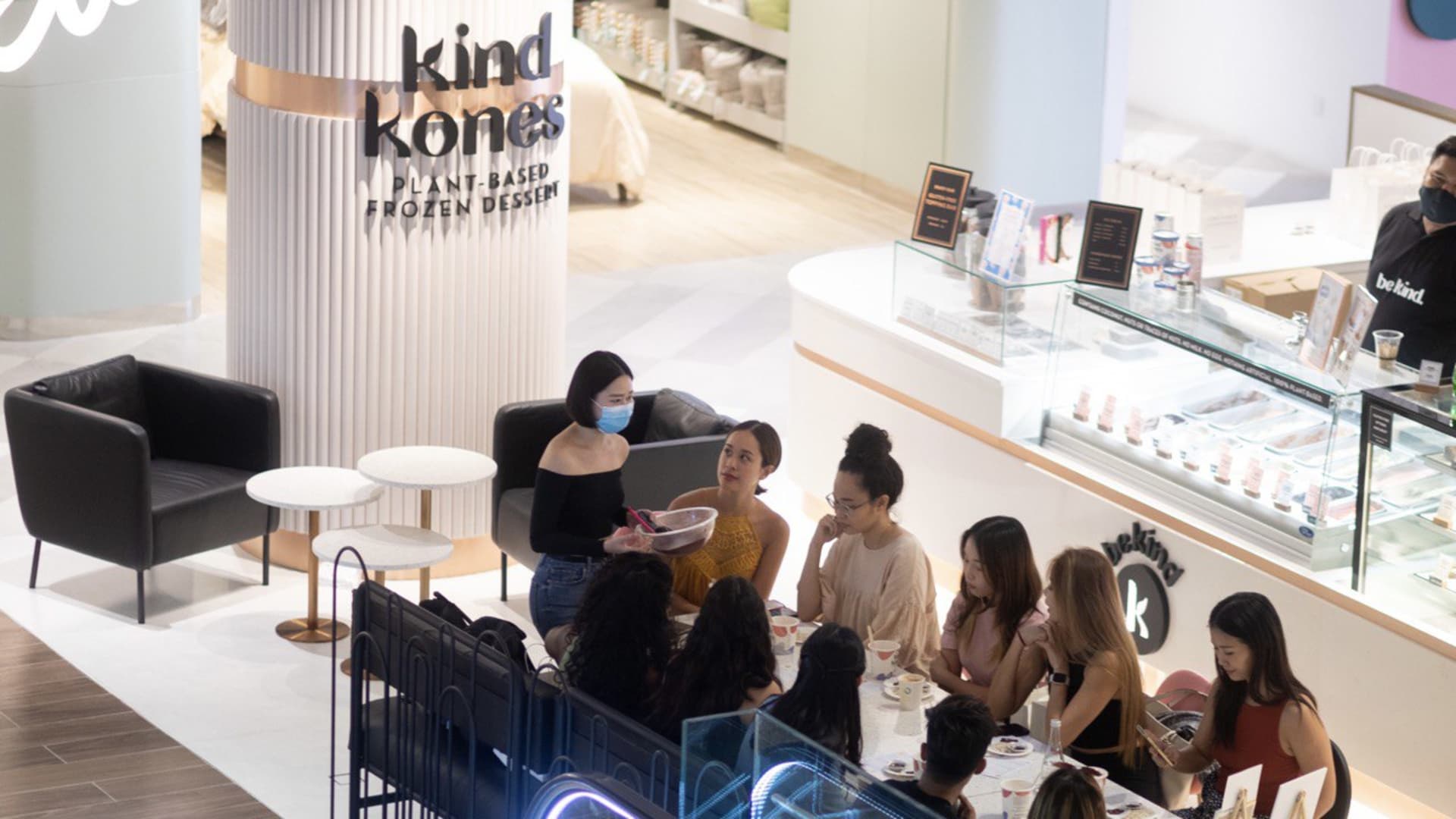
When Ishpal and Serina Bajaj approached a shopping mall in Kuala Lumpur, Malaysia, to open a vegan ice cream store, they were met with disapproval.
"They pretty much laughed, like nobody's going to eat plant-based ice cream," said Ishpal.
"I think the whole perception of it was that plant-based [desserts] were sorbets and fruit-based."
But the couple managed to whip up ice cream that was not just vegan, but "tastes just as good as any ice cream," said Serina.
Get top local stories in Southern California delivered to you every morning. Sign up for NBC LA's News Headlines newsletter.
When they finally found a space in another mall, Ishpal and Serina knew they were on the right track.
"The support was tremendous … we were doing about $8,500 to $10,000 a month," said Ishpal.
Now, the co-founders of Kind Kones said they are bringing in "20 times" that, with four stores across Malaysia and Singapore.
Money Report
CNBC Make It finds out how the duo, who are in their thirties, turned a pet project into a million-dollar business.
Their 'first-mover's advantage'
When Serina had her first child in 2017, she developed an intolerance to dairy, which propelled her to experiment with vegan ice cream at home.
The biggest challenge? Figuring out how to create a plant-based dessert, without compromising on taste.
Serina said: "Coconut is a huge ingredient for us. But how are we going to mask that coconut taste, so that it tastes as neutral as possible?"
"That was challenging, mostly trial-and-error at the time. But now we know how," she added coyly, without divulging the secret recipe.

While Ishpal and Serina knew their ice cream tasted good, they worried about whether a vegan dessert would appeal to the general public.
"Back then, veganism didn't really exist in Malaysia … you get the odd pint of ice cream in the supermarket that was perhaps, soy-based," Serina explained.
"And veganism was associated with bland, grassy food ... we had this idea of launching Kind Kones and making it a little business."
It was a "gamble" for Ishpal and Serina — who had no experience in the food industry — to put in over $140,000 into Kind Kones in its first year.
But they quickly realized, they had a "first-mover's advantage" with plant-based ice cream made from all-natural ingredients.
"We had people who would come and [tell us] they've never had ice cream because there's dairy," Serina said.
They also realized that their dessert catered to not just those with a plant-based lifestyle, but also people with skin conditions like eczema and other allergies.
"Children [are] a huge market for us … parents got their children to eat our ice cream because it catered to allergies as well," she said.
Sticking to their guns
Before launching her own venture, Serina grew up in the world of fashion in Thailand — thanks to her family retail business.
Her business background may have been an advantage, but she also realized that the food and beverage industry is "brutal."
"When you go out shopping, you're in a very good mood. But when you're hungry … you have this expectation that when you pay for something, it has to be perfect," she explained.
While the couple has developed recipes for ice cream that tastes as "indulgent" as non-vegan options, their products have not pleased every palette, Serina added.

"There are certain flavors that are never going to be like conventional ice cream … for example, our strawberry ice cream uses real strawberries and we sweeten it with bananas," she explained.
"It takes time to get used to it. But I think that's what we're about — we're trying to offer real taste."
Another common complaint? The price. The couple admitted their ice cream is more expensive compared with other brands.
"We have a price premium … the stuff that goes into it is expensive. We make everything, our nut milks are not store bought, for example," said Serina.
In response to inflation and rising food costs, Ishpal said they also had to do the "obvious and increased prices."
"But we introduced a junior scoop … so that you have an option [and] it's not too heavy on the pocket."
Nonetheless, the couple has always chosen to stick to their guns in the face of challenges.
"You definitely have to develop a thick skin and know that you cannot please everybody. You have to stick to what you're good at," Serina said.
That approach seemed to pay off as Kind Kones doubled its revenue from 2020 to 2021, said Ishpal.
"This year, we're on track to double revenue again."
Expansion plans
With fresh funds in the bag, Kind Kones has set its eyes on getting its frozen treats on the shelves of supermarkets in Malaysia and Singapore.
"It'll be a lot more easily accessible to people as well," said Ishpal.
The future seems bright for the couple, who are aiming to expand to other countries in Southeast Asia, such as Thailand and Indonesia.
According to a 2021 joint report from PwC, Rabobank and Temasek, there is growing demand for plant-based products across Asia.
This is driven by young, affluent consumers who are "increasingly critical" of the health risks and environmental impact of meat production, the report said.
"[Eating] plant-based has become a lifestyle and people are actually very concerned about the environment," said Serina.
"It is not a fad, it's here to stay."
Don't miss: How two teens built an app worth $900 million — Zepto’s founders share three tips
Like this story? Subscribe to CNBC Make It on YouTube!






